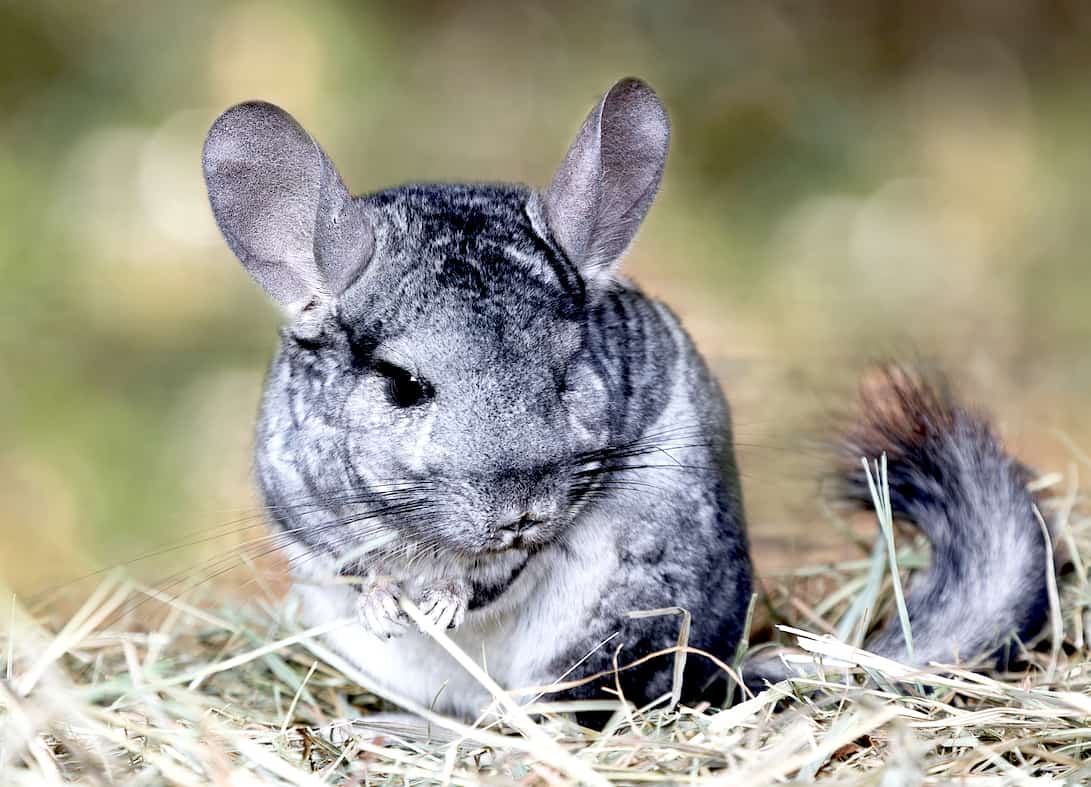It would appear at first glance that chinchillas and hamsters eat the same types of foods. There are many mixes and pellets on the market that all look exactly the same, which has us often thinking that all feeds for small animals are suitable for any species. This is simply not true.
So can chinchillas eat hamster food? No, chinchillas cannot eat hamster food. The nuts, seeds, corn, and peas present in hamster food are detrimental to a chinchilla’s digestive tract health. Chinchillas also require a large quantity of hay in their diet and less fat, while hamsters don’t need hay but do need more fat.
There are a few other important distinctions to be made between these two animals and their nutritional needs. Let’s take a closer look at the differences between the two to give you a better understanding.
Nutritional Needs of Chinchillas
A chinchilla’s diet should consist mostly of roughage such as hay and grass. This would be considered the bulk of their diet and should be readily available for them to graze on. A small amount of concentrate feed such as a chinchilla mix or pellets is also a good addition to their diet if fed correctly.
When looking at the formulation of a chinchilla’s diet, you should aim to provide them foods that are high in fiber, carbohydrates, protein, vitamins, and minerals.
High levels and fats and sugars are best avoided, as they can lead to liver disease and obesity in chinchillas, which are already prone to gaining too much weight. It is always best to choose foods that are specifically formulated for chinchillas.
Most chinchilla foods appear to be very similar to other types of rodent food, in particular pellets, but the content is very different. It is never a wise idea to feed your chinchilla hamster food since it will not provide them with the right nutrition.
Nutritional Needs of Hamsters
Unlike chinchillas, hamsters do not have a requirement for hay in their diet. There are 3 main elements to a hamster’s diet.
- Dry foods such as pellets of hamster mix
- Fresh fruits and vegetables
- Small amounts of protein such as small amounts of cheese or mealworms
Dry food such as hamster mix is usually made up of ingredients such as seeds, nuts, and peas, which provide them with a balanced level of vitamins and nutrients their tiny bodies need. There are many types of hamster mixes on the market to choose from which are great for hamsters, but not so much for chinchillas.
Leafy greens are usually the best source of vegetables for hamsters, but fruits and vegetables such as pears, carrots, and cabbage are also a great source of nutrition for our fluffy friends.
Extra protein can be given to your hamster in the form of high protein foods such as cheese, live insects, and small pieces of chicken and beef.
Chinchilla Vs Hamster – Diet
Now that we’ve taken a look at both of these adorable fluffy creatures separately, we’ll compare the two to show you why it’s so important to keep your chinchilla or hamsters on a diet made specifically for their species.
- Hay and Grass – Chinchillas have a strong need for hay which amounts up to about 80% of their overall diet. Hamsters do not require hay at all and will require foods that provide much more fat and protein than that of a chinchilla.
- Pellets and Mixes – Both chinchillas and hamsters can eat concentrate mixes or pellets in their diets as long as those products are species-specific. Hamsters require much more fat and protein in their diet than chinchillas do, so you will find hamster mixes to contain nuts, seeds, corn, and peas. It is usually best to only allow chinchillas pellets in small quantities, since their main diet should consist of hay. Never feed a chinchilla hamster food; the nutritional requirements are all wrong and can cause intestinal distress.
- Fruits and Vegetables – Fruits and vegetables are fine for both hamsters and chinchillas, however you should expect this foodstuff to factor into a hamster’s diet much more frequently than a chinchilla’s. Hamsters can be given fruits and vegetables as part of the main meal, while these products should be fed in small quantities as a treat for a chinchilla. Too much can cause stomach upsets and diarrhea.
- Water Consumption – Both chinchillas and hamsters require a constant flow of fresh water available. This doesn’t necessarily mean they will drink a lot, and both species are known to get dehydrated easily for this reason.
To wrap everything up, your little fluffball needs all the help it can get to thrive in captivity. As a proud chinchilla or hamster parent, it’s your responsibility to provide them with the proper species-specific diet so that they can live a long, healthy, and happy life.
Up Next: Can Chinchillas Eat Guinea Pig Food?
